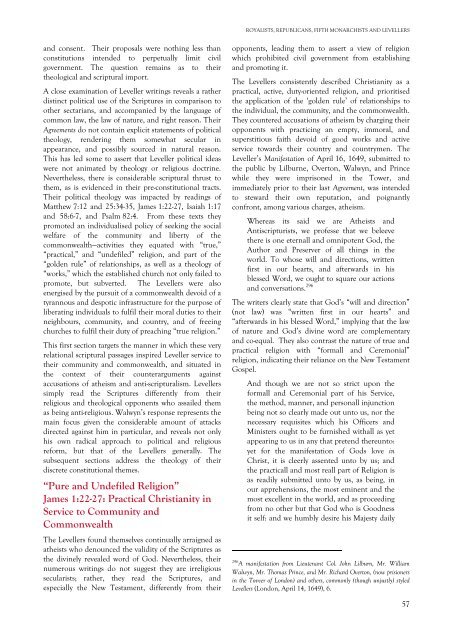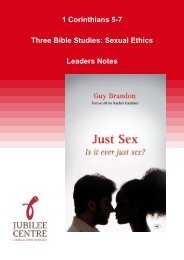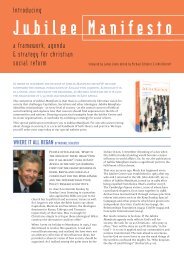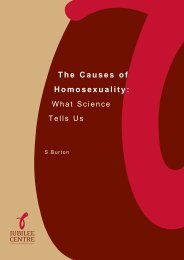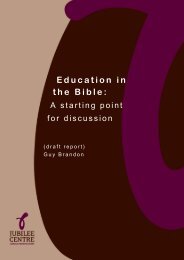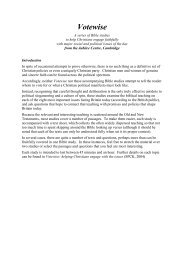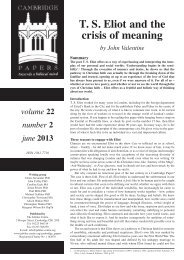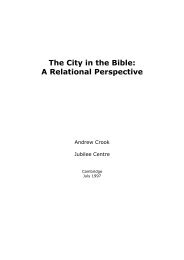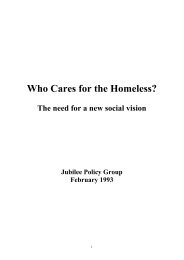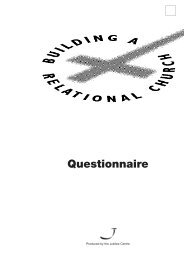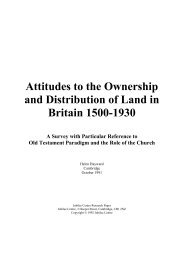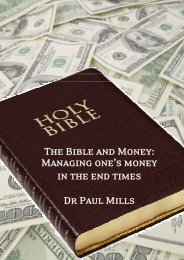Report Template - Jubilee Centre
Report Template - Jubilee Centre
Report Template - Jubilee Centre
Create successful ePaper yourself
Turn your PDF publications into a flip-book with our unique Google optimized e-Paper software.
ROYALISTS, REPUBLICANS, FIFTH MONARCHISTS AND LEVELLERS<br />
and consent. Their proposals were nothing less than<br />
constitutions intended to perpetually limit civil<br />
government. The question remains as to their<br />
theological and scriptural import.<br />
A close examination of Leveller writings reveals a rather<br />
distinct political use of the Scriptures in comparison to<br />
other sectarians, and accompanied by the language of<br />
common law, the law of nature, and right reason. Their<br />
Agreements do not contain explicit statements of political<br />
theology, rendering them somewhat secular in<br />
appearance, and possibly sourced in natural reason.<br />
This has led some to assert that Leveller political ideas<br />
were not animated by theology or religious doctrine.<br />
Nevertheless, there is considerable scriptural thrust to<br />
them, as is evidenced in their pre-constitutional tracts.<br />
Their political theology was impacted by readings of<br />
Matthew 7:12 and 25:34-35, James 1:22-27, Isaiah 1:17<br />
and 58:6-7, and Psalm 82:4. From these texts they<br />
promoted an individualised policy of seeking the social<br />
welfare of the community and liberty of the<br />
commonwealth—activities they equated with “true,”<br />
“practical,” and “undefiled” religion, and part of the<br />
“golden rule” of relationships, as well as a theology of<br />
“works,” which the established church not only failed to<br />
promote, but subverted. The Levellers were also<br />
energised by the pursuit of a commonwealth devoid of a<br />
tyrannous and despotic infrastructure for the purpose of<br />
liberating individuals to fulfil their moral duties to their<br />
neighbours, community, and country, and of freeing<br />
churches to fulfil their duty of preaching “true religion.”<br />
This first section targets the manner in which these very<br />
relational scriptural passages inspired Leveller service to<br />
their community and commonwealth, and situated in<br />
the context of their counterarguments against<br />
accusations of atheism and anti-scripturalism. Levellers<br />
simply read the Scriptures differently from their<br />
religious and theological opponents who assailed them<br />
as being anti-religious. Walwyn’s response represents the<br />
main focus given the considerable amount of attacks<br />
directed against him in particular, and reveals not only<br />
his own radical approach to political and religious<br />
reform, but that of the Levellers generally. The<br />
subsequent sections address the theology of their<br />
discrete constitutional themes.<br />
“Pure and Undefiled Religion”<br />
James 1:22-27: Practical Christianity in<br />
Service to Community and<br />
Commonwealth<br />
The Levellers found themselves continually arraigned as<br />
atheists who denounced the validity of the Scriptures as<br />
the divinely revealed word of God. Nevertheless, their<br />
numerous writings do not suggest they are irreligious<br />
secularists; rather, they read the Scriptures, and<br />
especially the New Testament, differently from their<br />
opponents, leading them to assert a view of religion<br />
which prohibited civil government from establishing<br />
and promoting it.<br />
The Levellers consistently described Christianity as a<br />
practical, active, duty-oriented religion, and prioritised<br />
the application of the ‘golden rule’ of relationships to<br />
the individual, the community, and the commonwealth.<br />
They countered accusations of atheism by charging their<br />
opponents with practicing an empty, immoral, and<br />
superstitious faith devoid of good works and active<br />
service towards their country and countrymen. The<br />
Leveller’s Manifestation of April 16, 1649, submitted to<br />
the public by Lilburne, Overton, Walwyn, and Prince<br />
while they were imprisoned in the Tower, and<br />
immediately prior to their last Agreement, was intended<br />
to steward their own reputation, and poignantly<br />
confront, among various charges, atheism.<br />
Whereas its said we are Atheists and<br />
Antiscripturists, we professe that we beleeve<br />
there is one eternall and omnipotent God, the<br />
Author and Preserver of all things in the<br />
world. To whose will and directions, written<br />
first in our hearts, and afterwards in his<br />
blessed Word, we ought to square our actions<br />
and conversations. 296<br />
The writers clearly state that God’s “will and direction”<br />
(not law) was “written first in our hearts” and<br />
“afterwards in his blessed Word,” implying that the law<br />
of nature and God’s divine word are complementary<br />
and co-equal. They also contrast the nature of true and<br />
practical religion with “formall and Ceremonial”<br />
religion, indicating their reliance on the New Testament<br />
Gospel.<br />
And though we are not so strict upon the<br />
formall and Ceremonial part of his Service,<br />
the method, manner, and personall injunction<br />
being not so clearly made out unto us, nor the<br />
necessary requisites which his Officers and<br />
Ministers ought to be furnished withall as yet<br />
appearing to us in any that pretend thereunto:<br />
yet for the manifestation of Gods love in<br />
Christ, it is cleerly assented unto by us; and<br />
the practicall and most reall part of Religion is<br />
as readily submitted unto by us, as being, in<br />
our apprehensions, the most eminent and the<br />
most excellent in the world, and as proceeding<br />
from no other but that God who is Goodness<br />
it self: and we humbly desire his Majesty daily<br />
296 A manifestation from Lieutenant Col. John Lilburn, Mr. William<br />
Walwyn, Mr. Thomas Prince, and Mr. Richard Overton, (now prisioners<br />
in the Tovver of London) and others, commonly (though unjustly) styled<br />
Levellers (London, April 14, 1649), 6.<br />
57


